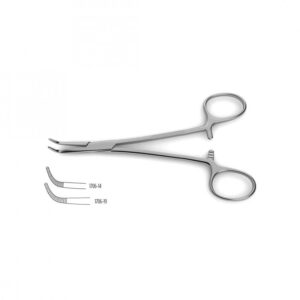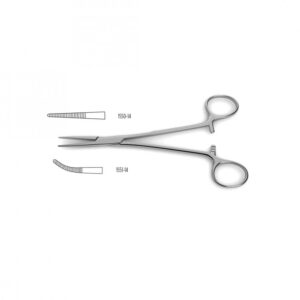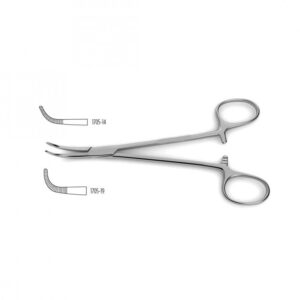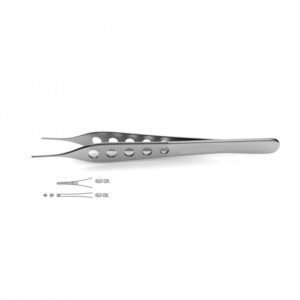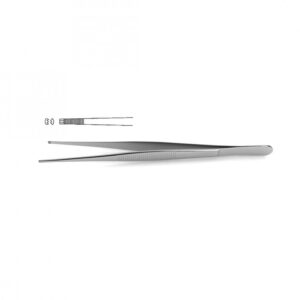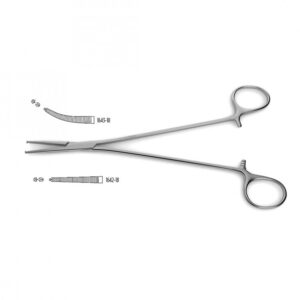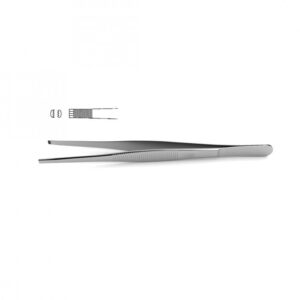| Name | Payr-Baby Pylorus Clamp |
| Lead Time | Lead time advised within 48 hours of order placement. |
| Competitor | ;135598;135-598;505214;50-5214;5052-14;5053-14;5052-14_5053-14; |
| Specialty | General Instruments-Clamps – Intestinal |
| Material Finish | Stainless Steel |
| Grade | Premium Operating Room |
| Units of Measurement | Each |
| Manufacturer | seemab surgical |
| Sterility | Non-Sterile |
| Usage | Reusable |
Payr-Baby Pylorus Clamp
Jaw length 2-3/16″ (55.0 mm), 5-3/4″ (14.5 cm)
Payr-Baby Pylorus Clamp is a popular instrument typically used to treat pyloric stenosis, which is a term used to describe the narrow opening of the stomach that goes into the small intestine in a small child. During a Pyloromyotomy, for instance, the 2 3/16″ jaw length can be used to temporarily close the end of bowel. This instrument also contains longitudinal serrations on the jaws that help assure a tight grip, as well as receiving the option of having the jaw tip with or without a pin.
SKU:
VI-01-305
Category: Forceps & Clamps
Description
Shipping & Delivery
Related products
Adson Suture Forceps
Adson Suture Forceps
w/ tying platform, 2.0 mm tips, 4-3/4" (12.1 cm), smooth platform
Adson Suture Forceps with Tying Platform are handcrafted from surgical grade German stainless steel. These forceps are designed with 2.0 mm tips and a tying platform. Available with a smooth platform to securely hold a suture or with 1x2 teeth and a smooth platform for extra grip. This instrument is protected by seemab surgical manufacturer warranty on defects in materials and workmanship.
Adson-Baby Forceps
Adson-Baby Forceps
narrow, curved, very delicate
Adson-Baby Forceps are typically used to grasp delicate tissue due to during general surgeries, especially in plastic surgery procedures. The very delicate pattern of the forceps includes partially serrated jaws that are narrow and curved. These jaws are also offered in two different lengths and are intended for tissue to be handled carefully.
Babcock Tissue Forceps
Babcock Tissue Forceps
standard pattern.
Babcock Tissue Forceps come in a standard pattern with semicircular rounded tips to allow for holding or grasping delicate body structures. These forceps are crafted from premium German operating-room grade stainless steel and are available in a wide variety of lengths.
Adson Thumb Forceps – Fenestrated Handles
Fenestrated handles, lightweight, 4-3/4" (12.1 cm)
Adson Thumb Forceps with Fenestrated Handles are handcrafted from surgical grade German stainless steel. Available in a variety of forms: for dressings with a serrated platform or for tissue with a serrated platform and 1x2 teeth. This lightweight model is ideal for plastic surgery procedures or any other procedure where surgeon fatigue may pose an issue.
Adlerkreutz Tissue Forceps – Narrow Jaws
Narrow jaws, 2x3 teeth
Adlerkreutz Tissue Forceps are handcrafted from surgical grade German stainless steel. Designed with narrow jaws and 2x3 teeth for a secure grip on tissues. The slim design allows for delicate and precise dissection and tissue handling while the wider grip assures a comfortable grip for the surgeon.
Adson Artery Forceps – Delicate
Delicate pattern, 1x2 teeth, 7-1/8" (18.0 cm)
Adson Artery Forceps are 7 1/8" and are developed with 1x2 teeth in a delicate pattern with either curved or straight jaws to suit different needs. Primarily applied during operations in which arteries need to be grasped or compressed, the teeth on the tips of the jaws interlock to confirm that a tight grip is held.
Adair-Allis Tissue Forceps
9x10 teeth, 6" (15.0 cm)
Adair-Allis Tissue Forceps are 6" long and are primarily used in general procedures in instances such as when diseased tissue needs to be held. The 9x10 teeth on the tips of the jaws provide a sure grasp of the tissue being held, and can also be used to approximate the edges of the membrane that creates the abdominal cavity lining.
Adlerkreutz Tissue Forceps
Adlerkreutz Tissue Forceps
4x5 teeth
Adlerkreutz Tissue Forceps are handcrafted from surgical grade German stainless steel. Designed with 4x5 teeth for a secure grip on tissues. The design allows precise dissection and tissue handling while the teeth assure a secure grasp. Available in a 6" or 8" model.


